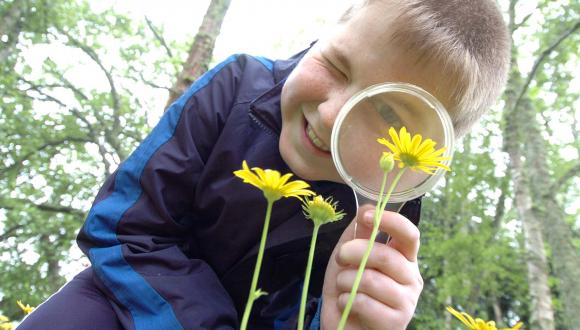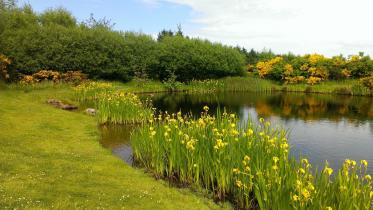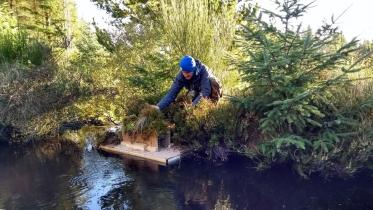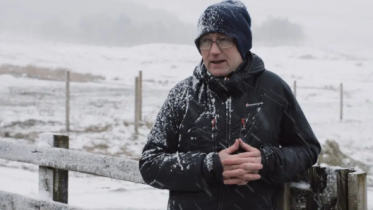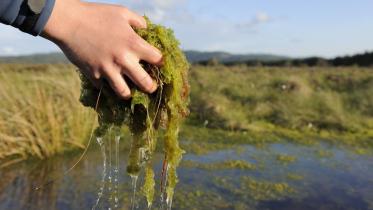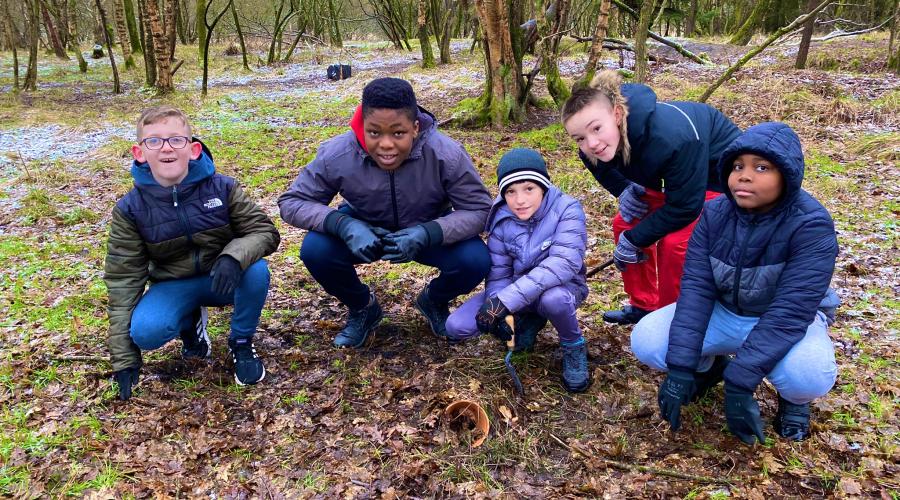
Learning in Local Greenspace with St Benedict’s Primary School - a case study
Why learn in local greenspace?
St Benedict’s Primary is located in the Easterhouse area of Glasgow, with large areas of greenspace on its doorstep. The school grounds have been developed to promote outdoor learning and play and are well used during lessons and at break times. The school was keen to use local greenspace to give pupils more varied opportunities for quality outdoor learning and support them to interact more with their community.
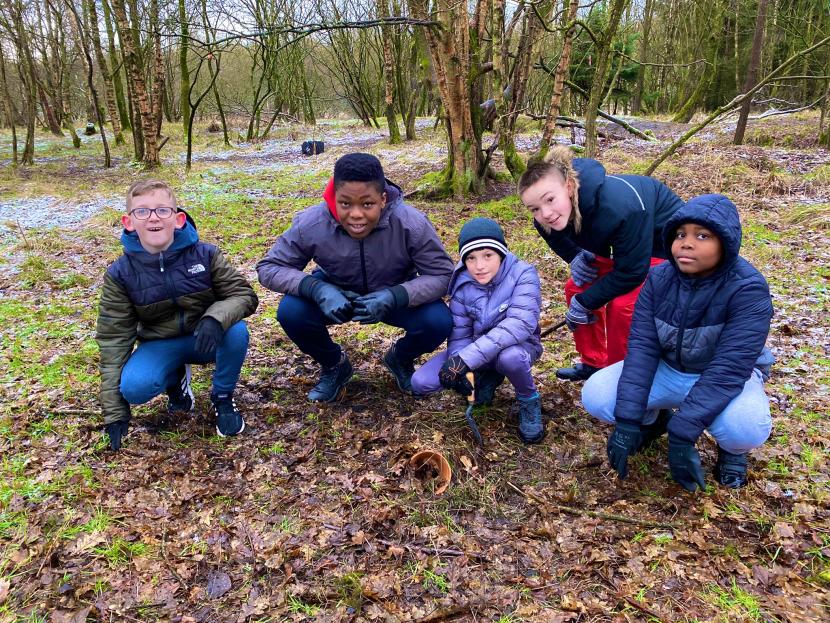
Finding your local greenspace
The school is lucky to be next to Bishop Loch Local Nature Reserve which is part of the Seven Lochs Wetland Park, Scotland's largest urban nature park. They can also access other nearby greenspaces, such as Cardowan Moss and Todd’s Well, without going near busy roads by using the Seven Loch’s Trail.
Joey, P 4/3, understands how fortunate they are:
“I loved the green and fresh air and I feel lucky that my school has woods across the road, not everyone has that.”
Accessing your local greenspace
Although teachers were aware that the woods were easily accessible and could be a great resource for learning, they had a number of concerns about safety. The Seven Lochs Community Engagement Officer, Claire Brady, ran a professional learning session in the woods to help staff see the learning opportunities and resolve perceived safety issues. Seven Lochs partners also led sessions for classes in the school grounds so that teachers could see how to safely run a session and get an idea of the activities they could do in the woods. Teachers then had the experience and confidence to start leading their own sessions.
“I have learned a lot from Claire and use these ideas with the children back at school.”
“Adult support is the biggest barrier in taking children outdoors.”
To overcome this and enable classes to get out to the woods, Support for Learning workers were made available and many teachers were then keen to go out.
Using your local greenspace
Seven classes at St Benedict’s each participated in weekly sessions with Claire and partners. These included activities such as minibeast hunts, environmental art, mini raft building, den building and fire lighting. The children really enjoyed experimenting with natural materials to build transitional art and obstacle courses, create role play and carry out maths tasks. They particularly benefited from seeing their teachers and peers enjoying being outdoors and taking risks in a controlled way, such as with fire building and den building. This gave the children the opportunity to feel a sense of adventure and excitement that can’t be recreated in a classroom.
“I loved learning about insects in the woods because it’s so interesting. You can find them in their natural habitats.”
“I loved seeing the deer! We had to be quiet so we didn’t scare them. They can run away and hide very easily”
P7A achieved the Bronze RSPB Wild Challenge Award by completing challenges, such as creating bird feeders and identifying mini-beasts. They look forward to taking this further and are aiming for the Silver Award next term. The RSPB provided ideas and materials for the teachers to use in the greenspace and suggested ways to extend the children’s learning and curiosity about bird life.
The pupils have other opportunities to learn and play in their greenspaces, including at an after-school club and Glasgow City Council Countryside Ranger Forest School sessions.
The teachers really appreciated the inter-disciplinary nature of outdoor learning and potential for development of co-operation, team skills, creativity, maths and literacy whilst keeping physically active. They also found that pupils are often more engaged in activities outdoors and that you can see different aspects of pupils’ personalities and abilities.
“The children have really benefitted from taking part in outdoor learning. They are always engaged and are learning great skills and information about the environment and ecosystem. You see the children’s personalities truly unfold in a different way than in the classroom environment. They regularly bring these experiences back into class and it informs their learning.”
Improving your local greenspace
The site is managed by Forestry and Land Scotland and they carry out maintenance and conservation work with the help of Seven Lochs Conservation volunteers. The pupils joined in litter picks, which really opened their eyes to how much litter is caused by people just not using a bin. They noticed the negative impact within the woods, especially relating to animals that may eat plastic and suffer as a result of our rubbish. This was evident when a water vole expert spoke to the children at assembly and pupils shared that they wanted to make a difference to help the local water vole population.
The school also had visitors from a bee charity who taught pupils about the importance of pollinators and the different types of bees to look out for. As a result the children had a much broader understanding of the importance of wild flowers and decided to plant some in our own school garden to encourage bees and butterflies.
Spreading & embedding learning in local greenspace
The school is committed to embedding outdoor learning and play into their curriculum.
Generally, teachers do want to do more outdoor learning but lack confidence and time to plan their own sessions so, when Jacqueline Murphy took on the role of lead teacher for outdoor learning, she developed resources for colleagues. Jacqueline is now in another role but her colleagues still use these resources regularly to take their own sessions outdoors, for example going on mini beast hunts and building mini beast hotels. The P1 teachers integrate their topic or story, such as ‘The Gruffalo’ and ‘We’re Going on a Bear Hunt’, into their outdoor learning.
Some staff and parents need a little persuasion that pupils can go out when the weather isn’t perfect. To try to combat this, information is shared with parents about outdoor learning to ensure that pupils know when and what clothing to bring. Children are then prepared to get involved and get dirty - one pupil enjoyed a full blown ‘mud angel’ because she had waterproof trousers, jacket and wellies! The school has some boots and waterproofs that pupils can borrow to ensure they have a good outdoor experience, however some of this is getting quite worn and will soon need replaced. The partnership with Seven Lochs has brought lots of contacts and opportunities for funding from external agencies, for instance via the Creative STAR Learning funding page. The Parent Council also supports the school immensely, including via the purchase of outdoor equipment.
During her time as Lead Teacher for Outdoor Learning, Jacqueline also provided natural and loose parts at break times to facilitate quality outdoor play. This has continued and has now become so popular that the area has to be timetabled to ensure fair access. Pupils are desperate to climb trees and make obstacle courses with tyres, pallets, crates, planks, sticks and stones. They have even repurposed old step aerobics equipment as outdoor building blocks. These enriched play experiences are resulting in less incidents of negative behaviour between peers, especially in particular a group of boys that are now engaged in building and playing, resulting in a much more positive experience of school.
All photos taken by Claire Brady from The Conservation Volunteers and teachers at St Benedict's School.
